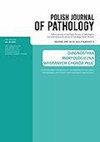胸椎smarca4缺陷未分化肿瘤-侵袭性肿瘤1例。
IF 0.6
4区 医学
Q4 PATHOLOGY
引用次数: 0
摘要
缺乏smarca4的未分化肿瘤表现为未分化和横纹肌样特征。这些高度侵袭性的肿瘤给诊断带来了重大挑战。它们的特征是SMARCA4失活突变,导致brahma相关基因1 (BRG1)的表达缺失。尽管其作为胸部肿瘤的稀缺性和低分化性,但重要的是要认识到这些肿瘤,因为尽管具有高度侵袭性,但未来有潜在的治疗选择,如免疫治疗和smarca4靶向治疗。本病例报告旨在提高对这种罕见肿瘤的认识,以评估未分化形态的病例。本文章由计算机程序翻译,如有差异,请以英文原文为准。
Thoracic SMARCA4-deficient undifferentiated tumour - a case of an aggressive neoplasm.
SMARCA4-deficient undifferentiated tumours exhibit undifferentiated and rhabdoid features. These highly aggressive neoplasms pose significant diagnostic challenges. They are characterised by an inactivating mutation of SMARCA4, leading to the loss of expression of Brahma-related gene 1 ( BRG1 ). Despite their rareness and poor differentiation as thoracic tumours, it is important to recognise these tumours because, despite being highly aggressive, there are potential treatment options for the future, such as immunotherapy and SMARCA4-targeted therapies. This case presentation aims to raise awareness of this rare neoplasm when evaluating cases presenting undifferentiated morphology.
求助全文
通过发布文献求助,成功后即可免费获取论文全文。
去求助
来源期刊

Polish Journal of Pathology
PATHOLOGY-
CiteScore
1.00
自引率
0.00%
发文量
21
审稿时长
>12 weeks
期刊介绍:
Polish Journal of Pathology is an official magazine of the Polish Association of Pathologists and the Polish Branch of the International Academy of Pathology. For the last 18 years of its presence on the market it has published more than 360 original papers and scientific reports, often quoted in reviewed foreign magazines. A new extended Scientific Board of the quarterly magazine comprises people with recognised achievements in pathomorphology and biology, including molecular biology and cytogenetics, as well as clinical oncology. Polish scientists who are working abroad and are international authorities have also been invited. Apart from presenting scientific reports, the magazine will also play a didactic and training role.
 求助内容:
求助内容: 应助结果提醒方式:
应助结果提醒方式:


